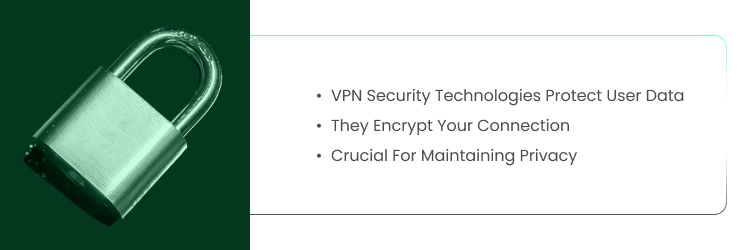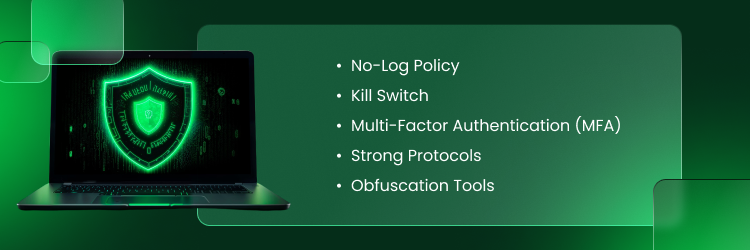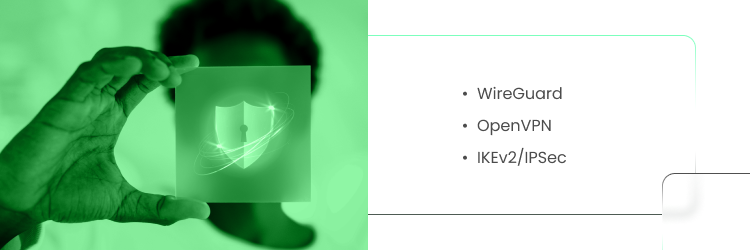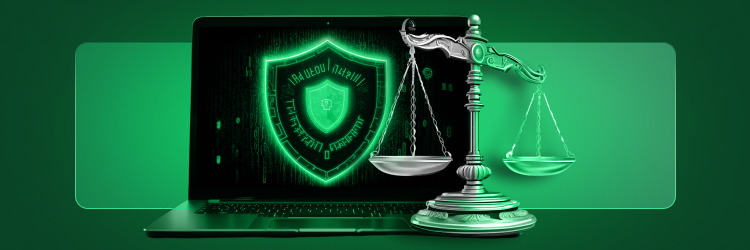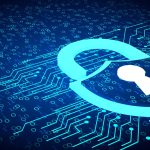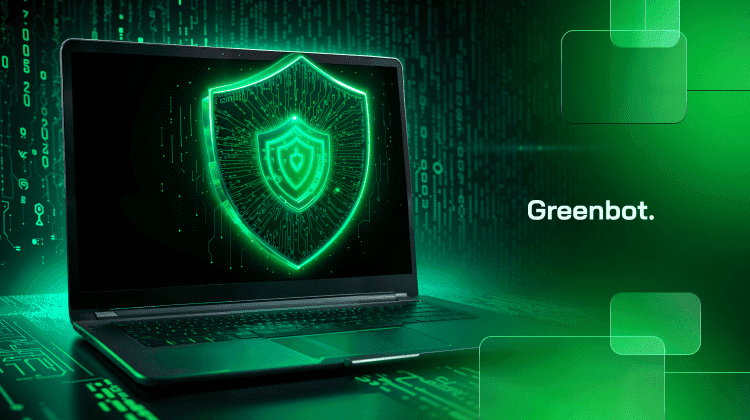
Your VPN connection promises privacy, but is it really secure? Can VPN services fully protect your data, or do some actually expose it? What risks come with free VPN services, and how can you stay safe?
This guide explains VPN security, the dangers of weak encryption, and how to keep your network access private. Don’t let the wrong VPN access put your operating system at risk—learn how to avoid threats and prevent hackers from gaining unauthorized access to your users’ internet access.
What is VPN Security?
VPN security technologies protect user data from cyber threats, AI attacks, and unauthorized access. They encrypt your connection, preventing third parties from intercepting sensitive information. This is crucial for maintaining privacy, especially on public networks.
A secure VPN offers features like DNS leak protection, kill switches, and no-log policies to ensure data remains private. However, some providers may store activity logs or use outdated encryption, weakening security. Therefore, verifying a VPN’s security measures before using it for safe browsing is essential.
Is VPN Safe? Understanding the Risks and Benefits
A VPN can enhance privacy, but its safety depends on the provider. Some VPNs prevent tracking and secure user data, making them valuable online protection tools. Yet, not all VPNs offer the same level of security. Some collect user logs, while free services often sell data, defeating the purpose of using a VPN.
Recent cybersecurity reports highlight growing threats against VPN services. Cisco Talos reports a rise in brute-force attacks on VPN authentication, SSH services, and web applications since March 2024. Many originate from TOR exit nodes and anonymizing proxies, leading to unauthorized access, account lockouts, and DoS attacks. As VPN usage increases, stronger authentication measures are essential to prevent these threats.
Poorly configured or free VPNs can introduce security gaps instead of closing them. Some lack essential features like a kill switch, which prevents accidental data exposure. Others may even contain malware, further endangering user privacy.
How Does a VPN Protect You?
A VPN connection shields your data by creating an encrypted virtual tunnel between your device and the internet. This encryption scrambles your online activity, making it unreadable to hackers, ISPs, and anyone trying to gain unauthorized access.
The most secure VPN services use AES-256 encryption, which is the same standard trusted by governments and financial institutions. Tunneling protocols like OpenVPN, WireGuard, and IKEv2/IPSec wrap your data in multiple layers of encryption, ensuring safe network access, even on public Wi-Fi networks.
Beyond encryption, a VPN also masks your IP address, preventing websites and third parties from tracking your location. This helps protect user’s internet access from surveillance and data collection.
As VPN technology evolves, machine learning plays an increasing role in enhancing security by detecting suspicious network patterns, optimizing encryption protocols, and adapting in real-time to cyber threats.
Key Security Features of a Safe VPN
Not all VPN services are secure. To avoid security risks, look for these essential features:
- No-Log Policy: A trusted VPN never stores your online activity, preventing ISPs or third parties from accessing your data.
- Kill Switch: If a VPN connection drops, a kill switch blocks your network access, preventing data leaks.
- Multi-factor authentication (MFA): Adds an extra security layer, requiring a second login step to prevent unauthorized logins.
- Strong Protocols: Secure VPN access relies on WireGuard, OpenVPN, or IKEv2, not outdated options like PPTP.
- Obfuscation Tools: Some VPNs disguise traffic to bypass VPN bans in restrictive regions.
VPN Myths and Security Risks: Do VPNs Really Work?
VPN Myths: What They Really Do
Many people believe VPNs offer total anonymity and complete security. That’s not true. Here’s what VPNs do—and what they don’t.
- Myth: A VPN makes you invisible online
Reality: A VPN hides your IP address, but websites can still track you through cookies, browser fingerprints, and login details. To improve privacy, use tracker blockers and private browsers.
- Myth: VPNs protect against all cyber threats
Reality: A VPN encrypts your internet connection but doesn’t block malware or phishing attacks. You still need antivirus software and good security habits.
- Myth: Free VPNs are just as safe as paid ones
Reality: Free VPN services often log and sell your data. Trusted VPNs follow no-log policies, offer strong encryption, and get independent security audits.
- Myth: A VPN boosts internet speed
Reality: A VPN may prevent ISP throttling, but encryption can slow down your connection. Speed depends on VPN server quality and location.
- Myth: A VPN alone keeps you secure
Reality: A VPN reduces tracking and secures your network access, but it’s not enough. Use multi-factor authentication (MFA), update software, and choose strong passwords.
VPN Security Risks: What Can Go Wrong?
While VPNs improve security, they aren’t invincible. Here’s how they can be compromised:
- Hacking Attacks: Cybercriminals use brute-force attacks on weak passwords to break into VPN accounts.
- Data Leaks: If a VPN connection drops, your real IP address can be exposed. A kill switch prevents this.
- Malicious VPNs: Some VPN services secretly collect data or come with built-in spyware.
- Weak Encryption: Outdated VPN protocols (like PPTP) can be cracked, exposing user’s internet access to hackers.
- Government Surveillance: Some countries force VPNs to log user activity, making them unsafe for true privacy.
To stay protected, use a VPN with strong encryption, no-log policies, and multi-layered security features.
Best Practices to Reduce VPN Security Risks
A VPN connection improves privacy, but it can still expose your data without the right precautions. Follow these steps to stay protected:
- Enable a Kill Switch: If your VPN connection drops, a kill switch blocks internet access to prevent IP address leaks.
- Use Multi-Factor Authentication (MFA): Add an extra layer of security by requiring a one-time password or fingerprint scan.
- Avoid Free VPN Services: Many log and sell user data. Choose trusted VPN services with a no-log policy.
- Choose Secure Protocols: Use WireGuard, OpenVPN, or IKEv2 instead of outdated, vulnerable options like PPTP.
- Monitor for Leaks: Check your VPN for DNS, IP, and WebRTC leaks to ensure your user’s internet access stays private.
- Beware of Fake VPNs: Some VPN apps contain malware or spyware. Always research providers before installing.
- Use VPN Obfuscation Features: If you’re in a country with VPN restrictions, obfuscation tools help disguise your VPN traffic.
- Update Your VPN Software: Security updates fix vulnerabilities and keep your VPN technology strong against threats.
What Are the Best VPN Encryption Protocols?
The strength of a VPN connection depends on its encryption protocol. Here are the most secure options:
- WireGuard: Fast, lightweight, and secure. Uses ChaCha20 encryption for speed and efficiency.
- OpenVPN: A trusted open-source protocol that balances security and performance. Works with both TCP and UDP.
- IKEv2/IPSec: Best for mobile devices. Offers stable connections and fast reconnections, especially on cellular networks.
⚠️ Outdated Protocols to Avoid:
- PPTP: Weak encryption, easily cracked.
- L2TP/IPSec: More secure than PPTP but still vulnerable and slower than modern options.
Legal Considerations: Is VPN Use Always Safe?
VPNs are legal in most countries, but some governments restrict or ban them. Nations like China, Russia, North Korea, and Iran allow only government-approved VPNs, which often log user activity. Using unauthorized VPNs in these regions can lead to fines, blocked access, or legal action. Some countries, including the UAE, Egypt, and Türkiye, impose strict VPN regulations.
Governments use various methods to enforce VPN bans. Some track VPN traffic with Deep Packet Inspection (DPI), while others force providers to log user data. In countries like Russia and India, VPNs must store user logs, compromising privacy. Iraq, Turkmenistan, and North Korea impose severe penalties for VPN use, making privacy protection challenging.
To avoid detection, users in restricted areas should select VPNs with obfuscation features, which disguise VPN traffic. Choosing a secure VPN provider with strong encryption and no-log policies helps maintain privacy. Always check local laws before using a VPN to avoid legal risks. Government-approved VPNs may not provide real privacy, as authorities can monitor user activity.
VPNs vs. Other Security Solutions: Do You Need More Protection?
A Virtual Private Network improves online security but doesn’t cover everything. Other tools, like Tor, proxies, and encrypted DNS, add extra privacy layers. Here’s how they compare:
- Tor (The Onion Router): Encrypts traffic and routes it through multiple servers, improving anonymity. However, it doesn’t secure all network traffic like a VPN client. It’s slow and unreliable for streaming or online banking.
- Proxies: Hide your IP address but don’t encrypt your connection. They help bypass geo-restrictions but expose users to tracking by internet service providers and hackers.
- Encrypted DNS: It prevents ISPs from tracking your browsing but does not hide your IP or fully encrypt traffic. A VPN provider encrypts all data for better protection.
- Using Multiple Tools Together: A VPN combined with Tor or encrypted DNS strengthens security. For maximum protection, users should choose a VPN with strong encryption, a no-log policy, and multi-factor authentication to prevent data leaks.
FAQs
Is using a VPN completely safe?
No. A VPN creates an encrypted virtual tunnel, but weak encryption or poor security practices can expose private data. Choose a VPN with strong authentication methods, a no-log policy, and solid protection against IP address leakage to stay protected.
Can I be traced if I use a VPN?
A VPN app hides a user’s IP address, but tracking is still possible through search history, most web browsers, cookies, and fingerprints. A private network with strong encryption and VPN solutions helps reduce risks.
Is there a downside to using a VPN?
Yes. Many VPN apps slow your internet connection due to encryption. Some sites block VPN users, and free VPNs may sell private data. A premium SSL VPN with a direct connection to a remote server minimizes these issues.
Can I use a VPN to access geo-blocked content?
Yes, but not always. A VPN changes your IP address, allowing access to restricted content. However, some platforms detect and block VPN systems. A VPN with stealth security features helps bypass restrictions.
What is the safest VPN protocol?
WireGuard, OpenVPN, and IKEv2/IPSec. WireGuard is fast, OpenVPN is flexible, and IKEv2 works well for mobile device connections. Avoid outdated protocols with security risks.
Do VPNs protect against hackers?
Partially. A VPN encrypts your internet history, blocking interception on public Wi-Fi networks or a local network. However, it doesn’t prevent malware or phishing. Combine it with strong security features for complete protection.
Is it illegal to use a VPN?
In most places, no. However, some countries restrict or ban VPNs, making VPN users vulnerable to penalties. Therefore, checking local laws before using a VPN to gain access in regulated regions is always a good idea.
Can a VPN Improve My Mobile Security?
Yes! VPN client software creates a secure tunnel to protect your internet traffic on a mobile phone or tablet. It encrypts your login credentials, prevents tracking, and keeps your private browsing safe. For Android users, choosing a VPN server with strong encryption reduces data usage risks and ensures a secure connection on any network.
Conclusion: Are VPNs a Safe and Reliable Security Tool?
A VPN client strengthens privacy by creating an encrypted virtual tunnel, shielding an IP address from surveillance and hackers. However, weak security or provider logs can still expose data.
For the highest level of VPN security, choose a trusted provider that offers advanced privacy features, strong encryption, and independent audits to ensure your data remains safe. Whether you’re accessing sensitive information, bypassing geo-restrictions, or simply safeguarding your browsing activity, a well-configured VPN is a critical component of a secure digital experience.


